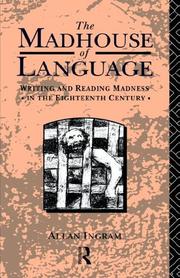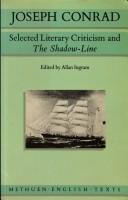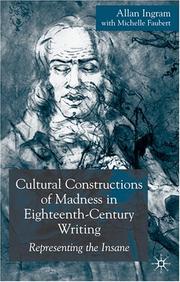| Listing 1 - 10 of 15 | << page >> |
Sort by
|
Book
ISBN: 0333440552 0333440544 9780333440551 Year: 1990 Publisher: Basingstoke Macmillan
Abstract | Keywords | Export | Availability | Bookmark
 Loading...
Loading...Choose an application
- Reference Manager
- EndNote
- RefWorks (Direct export to RefWorks)
English literature --- English language --- Lawrence, David Herbert --- Lawrence, D. H. (David Herbert), --- Lawrence, D. H. --- Criticism and interpretation --- Language --- Critique et interprétation --- Langue --- Lawrence, D.H. --- Critique et interprétation --- Language.

ISBN: 0415031907 Year: 1991 Publisher: London Routledge
Abstract | Keywords | Export | Availability | Bookmark
 Loading...
Loading...Choose an application
- Reference Manager
- EndNote
- RefWorks (Direct export to RefWorks)
Psycholinguistics --- Historical linguistics --- anno 1700-1799 --- Aliénation mentale dans la littérature --- Geesteszieken in de literatuur --- Gekte in de literatuur --- Insanity in literature --- Krankzinnigheid in de literatuur --- Malades mentaux dans la littérature --- Mental illness in literature --- Mentally ill in literature --- Waanzin in de literatuur --- 820 <410> --- English language --- -English literature --- -Literature and mental illness --- -Mentally ill --- -Insane --- Mental illness --- Mental patients --- Mentally disordered --- Sick --- People with mental disabilities --- Authors, Insane --- Mental illness and literature --- Poets, Insane --- British literature --- Inklings (Group of writers) --- Nonsense Club (Group of writers) --- Order of the Fancy (Group of writers) --- Germanic languages --- Psychopathology in literature --- Engelse literatuur--?<410> --- Style --- History and criticism --- History --- -Language --- -History --- Patients --- -Engelse literatuur--?<410> --- 820 <410> Engelse literatuur--?<410> --- -Insanity in literature --- Insane --- English literature --- Literature and mental illness --- Mentally ill --- Language --- 18th century --- Great Britain --- English literature - 18th century - History and criticism. --- Mentally ill - Great Britain - Language - History - 18th century. --- Literature and mental illness - History - 18th century. --- English language - 18th century - History. --- Mental illness in literature. --- Mentally ill in literature.
Book
ISBN: 9783770566891 9783846766897 Year: 2022 Publisher: Paderborn : Brill Fink,
Abstract | Keywords | Export | Availability | Bookmark
 Loading...
Loading...Choose an application
- Reference Manager
- EndNote
- RefWorks (Direct export to RefWorks)
This book explores the impacts, particularly on their writing, of the serious illnesses of Swift and Pope, alongside their respective understandings of health issues and within their period context. Both Swift and Pope spent most of their lives suffering from serious illness, Meniere's Disease (Swift) and Pott's Disease (Pope). This was at a time when medical understanding of these conditions was minimal. This book examines the effects of illness on each writer's relations with doctors, treatment, and medicine more widely, and how far and in what ways their own experiences affected their writing. The book explains the contemporary medical context and subsequent specialist knowledge of the illnesses, and places each alongside both writers' attempts to come to terms with their suffering, not least with respect to the different forms and styles of their works. Each writer's extensive correspondence is drawn on, as well as a range of texts.
Literature and medicine. --- Swift, Jonathan, --- Pope, Alexander, --- Literature --- Literature, Modern --- Psychology --- Study and teaching --- Modern literature --- Arts, Modern --- Language arts --- Aesthetics --- Psychology and literature
Book
ISBN: 0312036663 Year: 1990 Publisher: St. Martin's press
Abstract | Keywords | Export | Availability | Bookmark
 Loading...
Loading...Choose an application
- Reference Manager
- EndNote
- RefWorks (Direct export to RefWorks)
Lawrence, D. H. --- Lawrence, D. H. --- Criticism and interpretation. --- Language.

ISBN: 0416393500 Year: 1986 Publisher: London ; New York : Methuen,
Abstract | Keywords | Export | Availability | Bookmark
 Loading...
Loading...Choose an application
- Reference Manager
- EndNote
- RefWorks (Direct export to RefWorks)
Criticism. --- Conrad, Joseph, --- Conrad, Joseph

ISBN: 1403945950 Year: 2005 Publisher: Basingstoke Palgrave Macmillan
Abstract | Keywords | Export | Availability | Bookmark
 Loading...
Loading...Choose an application
- Reference Manager
- EndNote
- RefWorks (Direct export to RefWorks)
Book
ISBN: 9782304039061 9782304039078 9782304041606 9782304043563 9782304045000 9782304045567 9782304046687 Year: 2012 Publisher: Paris Manuscrit
Abstract | Keywords | Export | Availability | Bookmark
 Loading...
Loading...Choose an application
- Reference Manager
- EndNote
- RefWorks (Direct export to RefWorks)
History of the United Kingdom and Ireland --- History of France --- anno 1700-1799 --- Interpersonal relations --- Enlightenment --- History --- France --- Great Britain --- Social life and customs --- Civilization
Book
ISBN: 1137597178 1137597186 Year: 2016 Publisher: London : Palgrave Macmillan UK : Imprint: Palgrave Macmillan,
Abstract | Keywords | Export | Availability | Bookmark
 Loading...
Loading...Choose an application
- Reference Manager
- EndNote
- RefWorks (Direct export to RefWorks)
This collection examines different aspects of attitudes towards disease and death in writing of the long eighteenth century. Taking three conditions as examples – ennui, sexual diseases and infectious diseases – as well as death itself, contributors explore the ways in which writing of the period placed them within a borderland between fashionability and unfashionability, relating them to current social fashions and trends. These essays also look at ways in which diseases were fashioned into bearing cultural, moral, religious and even political meaning. Works of literature are used as evidence, but also medical writings, personal correspondence and diaries. Diseases or conditions subject to scrutiny include syphilis, male impotence, plague, smallpox and consumption. Death, finally, is looked at both in terms of writers constructing meanings within death and of the fashioning of posthumous reputation.
Literature, Modern—18th century. --- Eighteenth-Century Literature. --- 1700-1799 --- Literature, Modern --- Literature --- 18th century.
Book
Abstract | Keywords | Export | Availability | Bookmark
 Loading...
Loading...Choose an application
- Reference Manager
- EndNote
- RefWorks (Direct export to RefWorks)
History of the United Kingdom and Ireland --- History of France --- anno 1700-1799
Book
ISBN: 1526123371 9781526123374 9781526123367 1526123363 Year: 2018 Publisher: Manchester, UK : Manchester University Press,
Abstract | Keywords | Export | Availability | Bookmark
 Loading...
Loading...Choose an application
- Reference Manager
- EndNote
- RefWorks (Direct export to RefWorks)
The injunction, 'Know thyself!', resounding down the centuries, has never lost its appeal and urgency. The 'self' remains an abiding and universal concern, something at once intimate, indispensable and elusive; something we take for granted and yet remains difficult to pin down, describe or define. This volume of twelve essays explores how writers in different domains - philosophers and thinkers, novelists, poets, churchmen, political writers and others - construed, fashioned and expressed the self in written form in Great Britain in the course of the long eighteenth century from the Restoration to the period of the French Revolution. The essays are preceded by an introduction that seeks to frame several key aspects of the debate on the self in a succinct and open-minded spirit. The volume foregrounds the coming into being of a recognisably modern self. -- .
Self (Philosophy) --- Self in literature. --- English literature --- Philosophy --- History and criticism. --- Soi --- Soi (philosophie). --- Litterature anglaise --- English literature. --- British literature --- Inklings (Group of writers) --- Nonsense Club (Group of writers) --- Order of the Fancy (Group of writers) --- Dans la litterature. --- Histoire et critique. --- Literature --- Literature: History & Criticism --- LITERARY CRITICISM / European / English, Irish, Scottish, Welsh --- Literature: history & criticism --- John Locke. --- consciousness. --- individual. --- individualism. --- long eighteenth century. --- personal identity. --- secularisation. --- self-fashioning. --- self-love. --- the long eighteenth century. --- the self. --- the soul.
| Listing 1 - 10 of 15 | << page >> |
Sort by
|

 Search
Search Feedback
Feedback About UniCat
About UniCat  Help
Help News
News